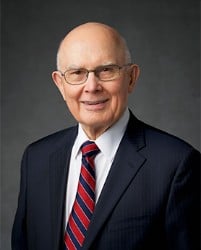
“The expression of our procreative powers is pleasing to God, but he has commanded that this be confined within the relationship of marriage”
| Conference Report, Oct. 1993, 99; or Ensign, Nov. 1993, 74

“The expression of our procreative powers is pleasing to God, but he has commanded that this be confined within the relationship of marriage”
| Conference Report, Oct. 1993, 99; or Ensign, Nov. 1993, 74

“I think it is an accurate statement to say that some people consider feelings of same-gender attraction to be the defining fact of their existence. There are also people who consider the defining fact of their existence that they are from Texas or that they were in the United States Marines…People can adopt a characteristic as the defining example of their existence and often those characteristics are physical. We have the agency to choose which characteristics will define us; those choices are not thrust upon us. The ultimate defining fact for all of us is that we are children of Heavenly Parents, born on this earth for a purpose, and born with a divine destiny. Whenever any of those other notions, whatever they may be, gets in the way of that ultimate defining fact, then it is destructive and it leads us down the wrong path.”

“The Church does not have a position on the causes of any of these susceptibilities or inclinations, including those related to same-gender attraction. Those are scientific questions — whether nature or nurture — those are things the Church doesn’t have a position on.”

Pornography impairs one’s ability to enjoy a normal emotional, romantic, and spiritual relationship with a person of the opposite sex. It erodes the moral barriers that stand against inappropriate, abnormal, or illegal behavior. As conscience is desensitized, patrons of pornography are led to act out what they have witnessed, regardless of its effects on their life and the lives of others.

“Pornographic or erotic stories and pictures are worse than filthy or polluted food. The body has defenses to rid itself of unwholesome food. With a few fatal exceptions, bad food will only make you sick but do no permanent harm. In contrast, a person who feasts upon filthy stories or pornographic or erotic pictures and literature records them in this marvelous retrieval system we call a brain. The brain won’t vomit back filth. Once recorded, it will always remain subject to recall, flashing its perverted images across your mind and drawing you away from the wholesome things in life.”
| Pornography, April 2005 General Conference

“Under the law of the Lord, a marriage, like a human life, is a precious, living thing. If our bodies are sick, we seek to heal them. We do not give up. While there is any prospect of life, we seek healing again and again. The same should be true of our marriages, and if we seek Him, the Lord will help us and heal us”
| (2007, May). Divorce. Ensign, 37(5), 70–73.

“a good marriage does not require a perfect man or a perfect woman. It only requires a man and a woman committed to strive together toward perfection.”
| Divorce. Ensign, 37(5), 70–73.

“For most marriage problems, the remedy is not divorce but repentance. . . . The first step is not separation but reformation.”
| Divorce. Ensign, 37(5), 70–73.

“The [current] American story about marriage, as told in the law and in much popular literature, goes something like this: marriage is a relationship that exists primarily for the fulfillment of the individual spouses. If it ceases to perform this function, no one is to blame and either spouse may terminate it at will”
| Protect the children. Ensign, 42(11), 43–46.

“Although the Savior could heal all whom He would heal, this is not true of those who hold His priesthood authority. Mortal exercises of that authority are limited by the will of Him whose priesthood it is. Consequently, we are told that some whom the elders bless are not healed because they are ‘appointed unto death’ (D&C 42:48). Similarly, when the Apostle Paul sought to be healed from the ‘thorn in the flesh’ that buffeted him (2 Corinthians 12:7), the Lord declined to heal him. Paul later wrote that the Lord explained, ‘My grace is sufficient for thee: for my strength is made perfect in weakness’ (v. 9). Paul obediently responded that he would ‘rather glory in my infirmities, that the power of Christ may rest upon me … for when I am weak, then am I strong’ (vv. 9-10).”
| "He Heals the Heavy Laden," Ensign, Nov. 2006, 5